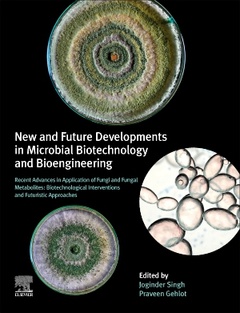Description
New and Future Developments in Microbial Biotechnology and Bioengineering
Recent Advances in Application of Fungi and Fungal Metabolites: Biotechnological Interventions and Futuristic Approaches
Coordinators: Panwar Joginder Singh, Gehlot Praveen
Language: English
Subject for New and Future Developments in Microbial Biotechnology...:
Keywords
Agriculture; Amphipathic proteins; Antifouling; Antifungal agents; Antimicrobial; Beauveria bassiana; Beauvericin; BGCs; Biodiesel; Bioinformatics; Biosensor; Bombyx mori; Botryosphaeria; Candida albicans; Canker; Comparative proteome profiling; CQDs; Databases; Dieback; Disease; Double-stranded RNA; Drug development; Endophyte; Environment; Enzyme; Enzymes; Exopolysaccharides; Farnesol; Feedstocks; Filamentous fungi; Fluorescence; Foam stabilization; Fungal enzymes; Fungal genome; Fungal genomes; Fungal metabolite; Fungal proteins; Fungal proteomics; Fungi; Fungus; Gene regulation; Genetic cluster; Genetically modified fungi; Genome mining; Green synthesis; Gummosis; Heterologous protein production; Horizontal gene transfer; Host-fungal interactions; Hydrophobins; Immobilization; Immunomodulatory; In silico tools; Indole alkaloids; Inducible promoter; Industrial enzyme; Lasiodiplodia; Lipase; Lipid; Mass spectrometry; Material dispersion; Metabolic engineering; Metabolites; Metal ions; Mushrooms; Nanoparticles; Natural sources; Nonribosomal peptides; Pathogen; Photoluminescence; Phytopathogens; Pichia pastoris; PKS and NRPS; Polyketides; Polysaccharides; Posttranslational modifications; Protein biomarkers; Protein production; Protein purification; Quorum sensing; Reactor; Recombinant protein; Resistance; Rodlets; Secondary metabolites; Selenium; Selenoproteins; signaling; Silencing; Silkworm; Surface stability; Taxol; Terpenes; Toxic; Transduction; Transesterification; Two-dimensional polyacrylamide gel electrophoresis; Xylanases; Yeast to hyphal transition
316 p. · 21.4x27.6 cm · Hardback
Description
/li>Contents
/li>Biography
/li>Comment
/li>
New and Future Developments in Microbial Biotechnology and Bioengineering: Recent Advances in Application of Fungi and Fungal Metabolites: Biotechnological Interventions and Futuristic Approaches is an invaluable resource for researchers planning to work in applied biotechnological interventions and futuristic approaches to fungi and fungal metabolite utilization. Special emphasis is placed on new research relating to fungal-based recombinant DNA technology and genomics analysis which place yeasts and filamentous fungi at the forefront of various contemporary commercial applications. Written in an easy-to-follow language by active researchers, the book presents cutting-edge fungal biotechnological applications in a manner that is accessible to all.
2. DNA barcoding of phytopathogenic fungi
3. Genome mining for identification of gene clusters encoding important fungal metabolites
4. Hydrophobins- Exclusive Proteins from Fungi
5. Farnesol: From Perfumery to Quorum Sensing
6. Hydrolytic xylanases production from fungi- an assessment for their production, properties and computational analysis of its gene sequences
7. Selenium Fortified Proteins and Polysaccharides from Macrofungi
8. Computational approach to understand fungal secondary metabolites and responsible biological molecules
9. Novel Fungi for Green Synthesis of Nanoparticles and their Efficacy against Plant Disease Management
10. dsRNA: the next generation foliar fungicide
11. Bioenergy: Fungal Lipase Mediated Biodiesel Process Technology
12. Fungi derived carbon quantum dots: fluorescent detector for toxic heavy metal ion detection
13. Bioprospecting for secondary metabolites of Botryosphaeriaceae family from a biotechnological perspective
Dr. Praveen Gehlot is Associate Professor, Department of Botany, Jai Narain Vyas University Jodhpur. He did his PhD from JNV University Jodhpur, under the able guidance of Prof. D.K. Purohit. He has about 18 years of teaching and research experience. He has been an awardee of Young Scientist under FAST Track Scheme by Department of Science and Technology, New Delhi and later worked as a Pool-Officer of Council of Scientific and Industrial Research, New Delhi. Earlier, he taught at Budha Institute of Technology and Science Research College, Jodhpur and Government Bangor PG College, Pali, Rajasthan and subsequently served as an Associate Professor and Head, Department of Microbiology, Maharaja Ganga Singh University, Bikaner, Rajasthan. Dr. Gehlot worked out three major research projects sponsored by UGC, DST and CSIR, New Delhi. He has published more than 80 research papers, book chapters
- Introduces recent biotechnological interventions and futuristic approaches to fungi and their metabolites
- Elaborates on perspectives and diverse applications of harnessing the potential of fungi and fungal metabolites in biotechnology
- Describes traditional uses and modern practices of accessing the potential of fungi and their metabolites in solving future needs




